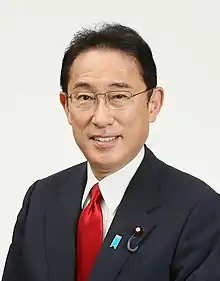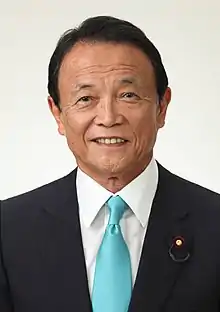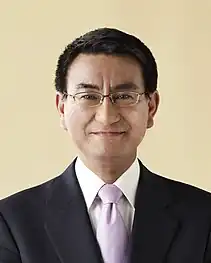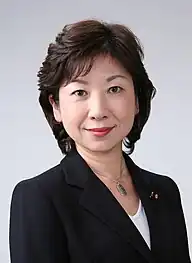| |||||||||||||||||||||||||
| |||||||||||||||||||||||||
_Leadership_election.svg.png.webp) Election results | |||||||||||||||||||||||||
| |||||||||||||||||||||||||
The 2020 Liberal Democratic Party of Japan leadership election was triggered by Shinzo Abe's announcement on 28 August 2020 that he would resign as President of the Liberal Democratic Party and Prime Minister of Japan, citing a relapse of his colitis. Voting took place on 14 September 2020 to elect the next president of the Liberal Democratic Party of Japan, three days before the National Diet was scheduled to hold a session to elect the new Prime Minister.[1] Initially scheduled to be held in September 2021, incumbent LDP president and the longest-serving Prime Minister of Japan, Shinzo Abe, suddenly resigned on 28 August 2020, citing recent health concerns, prompting an election to select the President to serve the rest of Abe's term.[2][3][4]
Chief Cabinet Secretary Yoshihide Suga easily won the election, securing endorsements from a majority of voting members of the party in the days preceding the vote.[5] As the Liberal Democratic Party controlled a majority in the National Diet as a member of the governing coalition, Suga successfully succeeded Abe as Prime Minister of Japan on 16 September 2020. His principal rival, Fumio Kishida, later succeeded him as prime minister after Suga's resignation in October 2021.
Background
Following several hospital visits which launched speculation into his health,[6][7] incumbent Prime Minister Shinzo Abe announced during a press conference on 28 August 2020 that he would resign before the end of his final term in office due to a resurgence of his chronic ulcerative colitis. During the press conference, Abe announced that as a result the LDP is preparing for a leadership election to choose his successor, and that he would not endorse any specific candidate.[2][3][4]
Procedure
There are two ways by which the president could be elected in the leadership election: the first would be an open election in which voting power is given to both party members and members of the National Diet. Each would receive half of the voting power to elect the new president. The other method would allow the vote to be restricted to the Diet members (394) and representatives from each of Japan’s 47 prefectures (141), which would add up to 535 electors.[8] According to an LDP lawmaker, Toshihiro Nikai, the party's secretary-general, decided on the second option.[9] To appear on the ballot, candidates must receive at least 20 nominations from the 394 Diet members in the LDP caucus.[10]
Timeline
2020
- 28 August – Shinzo Abe announces his resignation as Prime Minister and LDP president. He will remain on until a successor is chosen.[2][3][4]
- 29 August – Party officials announce the election will take place someday before, on, or after 15 September 2020.[11]
- 31 August – Party officials announce the election will be held on 14 September 2020.[1]
- 1 September – Former Foreign Affairs Minister Fumio Kishida and former Defense Minister Shigeru Ishiba officially announce their candidacies.[12]
- 2 September – Chief Cabinet Secretary Yoshihide Suga officially announces his candidacy.[13]
- 8 September – Campaign officially began. The candidates held a joint press conference.[14]
- 9 September – The first of two public debate between the leadership candidates was held.[14]
- 12 September – The second public debate between the leadership candidates was held.[14]
- 14 September – The election was held; Yoshihide Suga wins on the first ballot with 377 votes.
Candidates
Declared
| Candidate(s) | Date of birth | Notable positions | Party faction(s) | District(s) | Announced | Reference(s) | |
|---|---|---|---|---|---|---|---|
 |
4 February 1957 (age 63) |
Member of the House of Representatives (since 1986) Defense Minister (2007–2008) 2008, 2012 and 2018 LDP leadership candidate |
Suigetsukai | 1 September | [12] | ||
 |
29 July 1957 (age 63) |
Member of the House of Representatives (since 1993) Minister of Foreign Affairs (2012–2017) Acting Defense Minister (2017) |
Kōchikai | 1 September | [15] | ||
 |
6 December 1948 (age 71) |
Chief Cabinet Secretary (since 2012) Member of the House of Representatives (since 1996) Minister for Internal Affairs and Communications (2006–2007) |
none | 2 September | [13] | ||
Declined
- Tarō Asō, Deputy Prime Minister, Minister of Finance, member of the House of Representatives for Fukuoka 8th district; former Prime Minister (2008–2009) and former party president (2008–2009). Grandson of former Prime Minister Shigeru Yoshida and brother of Princess Tomohito of Mikasa.[16]
- Tomomi Inada, member of the House of Representatives for Fukui 1st district; former Minister of Defense (2016-2017), Minister of Administrative Reform (2012-2014), Minister of State for Regulatory Reform (2012-2014).[12]
- Shinjiro Koizumi, Minister of the Environment, member of the House of Representatives for Kanagawa 11th district. Son of former Prime Minister Junichiro Koizumi.[17]
- Tarō Kōno, runner-up in the 2009 leadership election; Minister of Defense, member of the House of Representatives for Kanagawa 15th district; former Minister of Foreign Affairs (2017–2019) and former Chair of the National Public Safety Commission (2015–2016). Son of Yōhei Kōno, a former Speaker of the House of Representatives.[12]
- Toshimitsu Motegi, Minister for Foreign Affairs, member of the House of Representatives for Tochigi 5th district; former Minister of Economy, Trade and Industry (2012–2014).[12]
- Yasutoshi Nishimura, third place candidate in the 2009 leadership election; Minister of State for Economic and Fiscal Policy, member of the House of Representatives for Hyogo 9th district.[18]
- Seiko Noda, member of the House of Representatives for Gifu 1st district; former Minister for Internal Affairs and Communications (2017–2018). Wife of Yōsuke Tsuruho, member of the House of Councillors for Wakayama Prefecture.[12]
- Hakubun Shimomura, current party election strategy chief, member of the House of Representatives for Tokyo 11th district; former Minister of Education, Culture, Sports, Science and Technology (2012–2015).[12]
Recommenders
Endorsements
- Members of the National Diet
- Tarō Asō (R)
- Deputy Prime Minister; Minister of Finance; leader of the Shikōkai faction; member of the House of Representatives for Fukuoka 8th district; former Prime Minister, 2008-2009; former party president, 2008-2009)[13]
- Hiroyuki Hosoda (R)
- Leader of the Seiwa Seisaku Kenkyūkai faction; member of the House of Representatives for Shimane 1st district); former Chief Cabinet Secretary, 2004-2005)[13]
- Nobuteru Ishihara (R)
- Leader of the Kin-Mirai Seiji Kenkyūkai faction; member of the House of Representatives for Tokyo 8th district; former Minister of the Environment, 2012-2014)[13]
- Toshihiro Nikai (R)
- Secretary-General of the Liberal Democratic Party; leader of the Shisuikai faction; member of the House of Representatives for Wakayama 3rd district; former Minister of Economy, Trade and Industry, 2005-2006, 2008-2009; Minister of Transport, 1999-2000)[13]
- Wataru Takeshita (R)
- Leader of the Heisei Kenkyūkai faction; member of the House of Representatives for Shimane 2nd district; former Minister for Reconstruction, 2014-2015)[13]
- Prefectural politicians
- Municipal politicians
- Party factions
- Seiwa Seisaku Kenkyūkai (Largest faction in the LDP; 98 members)[19][20][21]
- Shikōkai (Second-largest faction in the LDP; 54 members)[19][20][21]
- Heisei Kenkyūkai (Third-largest faction in the LDP; 54 members)[19][20][21]
- Shisuikai (Fourth-largest faction in the LDP; 47 members)[19][20][21]
- Kin-Mirai Seiji Kenkyūkai (Small faction in the LDP; 11 members)[19][20][21]
- Other prominent individuals
- Organizations
- Media
- Total endorsements: 10
Opinion polling
Nationwide
| Polling firm/link | Date of polling | Sample size | Fumio Kishida | Shinjiro Koizumi | Tarō Kōno | Shigeru Ishiba | Hakubun Shimomura | Yoshihide Suga | Undecided/NOTA | Notes |
|---|---|---|---|---|---|---|---|---|---|---|
| Mainichi Shimbun/SSRC | 9 September 2020 | Unknown | – | – | – | 36% | – | 44% | 20% | |
| Asahi Shimbun | 2–3 September 2020 | 1,130 | 5% | – | – | 25% | – | 38% | 32% | |
| Nikkei/TV Tokyo | 29–30 August 2020 | Unknown | 6% | 14% | 15% | 28% | – | 11% | 26% | |
| Kyodo News | 28–30 August 2020 | 1,050 | 7.5% | 10.1% | 13.6% | 34.3% | – | 14.3% | 20.2% |
Results
| Candidate | Diet members | Prefectural representatives | Total points | |||||
|---|---|---|---|---|---|---|---|---|
| Votes cast | % | Votes (w/o Okinawa) |
Delegates | % | Total votes | % | ||
 |
Yoshihide Suga | 288 | 73.1% | >364,866 | 89 | 63.1% | 377 | 70.5% |
 |
Fumio Kishida | 79 | 20.1% | >91,094 | 10 | 7.1% | 89 | 16.6% |
 |
Shigeru Ishiba | 26 | 6.6% | >216,022 | 42 | 29.8% | 68 | 12.7% |
| Total | 394 | 100% | >671,982 | 141 | 100% | 535 | 100% | |
44 prefectural LDP branches held primaries, while the prefectural federations in Hokkaidō and Niigata conducted questionnaire-style surveys among their members and the LDP Akita didn't hold any form of membership vote.
Of the 46 primaries or surveys, Kishida only carried his home prefecture of Hiroshima, winning all three delegates, and Yamanashi where he won two delegates over one for Suga.
Ishiba won all three delegates in his home prefecture of Tottori, and carried Toyama, Mie, Shimane, Kōchi and Miyazaki by two delegates to one over Suga. Yamagata, Fukushima, Kagawa, Nagasaki and Kumamoto split their delegates evenly between the three candidates.
In all other prefectures, Suga prevailed, winning either all three prefectural delegates, or two with the third going to Ishiba, depending on the vote margin of his victory and on whether the primary voting system was d'Hondt proportional, as it was in the majority of prefectures, or FPTP.[23]
References
- 1 2 3 "Japan's Shinzo Abe steps down as PM due to health concerns". The Asahi Shimbun. 31 August 2020. Archived from the original on 1 September 2020. Retrieved 31 August 2020.
- 1 2 3 "Shinzo Abe: Japan's PM resigns for health reasons". BBC News. 28 August 2020. Archived from the original on 28 August 2020. Retrieved 28 August 2020.
- 1 2 3 "Japan's PM Shinzo Abe resigns because of ill-health". Al Jazeera. 28 August 2020. Archived from the original on 28 August 2020. Retrieved 28 August 2020.
- 1 2 3 "Japan's Shinzo Abe steps down as PM due to health concerns". National Post. 28 August 2020. Retrieved 28 August 2020.
- ↑ Sugiyama, Satoshi (14 September 2020). "Yoshihide Suga set to become Japan's prime minister after winning LDP election". The Japan Times. Archived from the original on 14 September 2020. Retrieved 14 September 2020.
- ↑ "Shinzo Abe hospital visit stokes speculation over successor". Financial Times. 18 August 2020. Archived from the original on 21 August 2020. Retrieved 28 August 2020.
- ↑ "Japan's Shinzo Abe back to hospital over health worries". Euronews. 24 August 2020. Archived from the original on 28 August 2020. Retrieved 28 August 2020.
- ↑ "Japan's Leader Is Leaving. Here's How It Might Pick a New One". New York Times. 28 August 2020. Archived from the original on 28 August 2020. Retrieved 28 August 2020.
- ↑ "Race to succeed Abe kicks off with no clear favorite". 29 August 2020. Archived from the original on 29 August 2020. Retrieved 29 August 2020.
- ↑ "Japan set for new PM in weeks as Shinzo Abe's party plans speedy vote". Financial Times. 30 August 2020. Archived from the original on 30 August 2020. Retrieved 31 August 2020.
- ↑ "In race to replace Japan's Abe, loyalist Suga emerges as strong contender". Reuters. 29 August 2020. Archived from the original on 30 August 2020. Retrieved 29 August 2020.
- 1 2 3 4 5 6 7 "Suga front-runner in Japan's LDP race as grassroots members excluded from vote". Mainichi Daily News. 1 September 2020. Archived from the original on 1 September 2020. Retrieved 1 September 2020.
- 1 2 3 4 5 6 7 "Yoshihide Suga launches bid to become Japan's next prime minister". Al Jazeera. 2 September 2020. Archived from the original on 2 September 2020. Retrieved 2 September 2020.
- 1 2 3 "Japan's LDP Leadership Race Candidates to Hold Public Debates on September 9, 12". New York Times. 3 September 2020. Archived from the original on 14 September 2020. Retrieved 5 September 2020.
- ↑ "Japan's Kishida Says Can Show Strength in Economic, Foreign Policy Fields". The New York Times. 2 September 2020. Archived from the original on 14 September 2020. Retrieved 4 September 2020.
- ↑ "Japan PM Abe resigns due to illness with many issues unresolved". Kyodo News. 28 August 2020. Archived from the original on 29 August 2020. Retrieved 29 August 2020.
- ↑ Kajimoto, Tetsushi; (ed..) Mallard, William (30 August 2020). "Japan's Koizumi won't seek to succeed Abe as PM, would back Kono: NHK". Reuters. Archived from the original on 30 August 2020. Retrieved 30 August 2020.
- ↑ "Japan gov't spokesman Suga gains support of major faction in replacing Abe". Mainichi Daily News. 31 August 2020. Archived from the original on 14 September 2020. Retrieved 1 September 2020.
- 1 2 3 4 5 6 7 "総裁選、竹下派が菅氏を支持 茂木外相の立候補は見送り". Asahi Shimbun (in Japanese). 2 September 2020. Archived from the original on 11 September 2020. Retrieved 12 September 2020.
- 1 2 3 4 5 6 7 "菅氏優勢、5派閥が支持 自民党総裁選". Nihon Keizai Shimbun (in Japanese). 3 September 2020. Archived from the original on 4 September 2020. Retrieved 12 September 2020.
- 1 2 3 4 5 6 7 Mulgan, Aurelia George (6 September 2020). "Suga's a sure bet in Japan's leadership election". East Asia Forum. Archived from the original on 7 September 2020. Retrieved 12 September 2020.
- ↑ "自民党総裁選結果 菅氏377票 岸田氏89票 石破氏68票". NHK (in Japanese). 14 September 2020. Archived from the original on 15 September 2020. Retrieved 16 September 2020.
- ↑ Yomiuri Shimbun, September 17, 2020: 早わかり! 自民党総裁選2020, table with primary votes & delegate count by prefecture & candidate at the bottom, retrieved August 31, 2021. (Okinawa results are missing in the source as they were still "scheduled to be published"; the turnout is published on the website of the LDP Okinawa, the result apparently isn't.)

.jpg.webp)


_(cropped).jpg.webp)
.jpg.webp)

.jpg.webp)